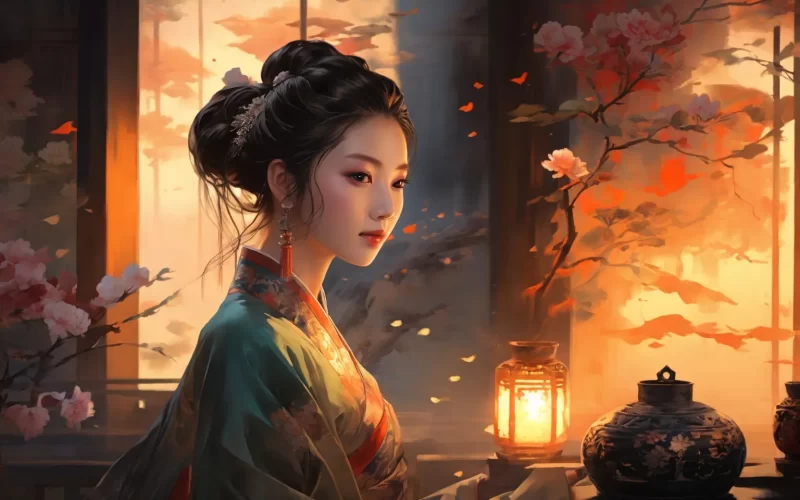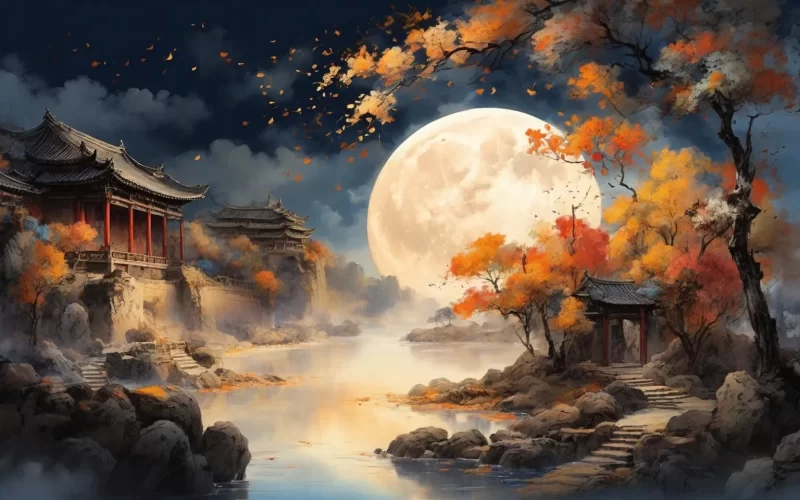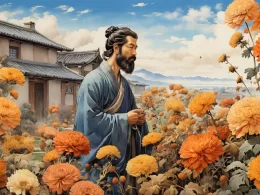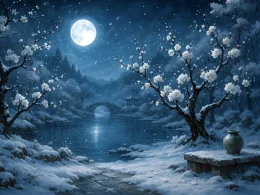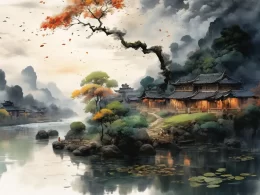Only to wanderers can come
Ever new the shock of beauty,
Of white cloud and red cloud dawning from the sea,
Of spring in the wild-plum and river-willow.
I watch a yellow oriole dart in the warm air,
And a green water-plant reflected by the sun.
Original Poem
「和晋陵陆丞早春游望」
杜牧
独有宦游人,偏惊物候新。
云霞出海曙,梅柳渡江春。
淑气催黄鸟,晴光转绿苹。
忽闻歌古调,归思欲沾襟。
Interpretation
Composed in the late 7th century during Du Shenyan's posting to Jiangyin—a period of professional frustration—this poem was written in response to a fellow official's spring excursion verse. While depicting Jiangnan's spring scenery, it subtly conveys the melancholy of an exiled bureaucrat, blending seasonal observations with homesickness and career disillusionment.
First Couplet: « 独有宦游人,偏惊物候新。 »
Dú yǒu huàn yóu rén, piān jīng wù hòu xīn.
Only we wandering officials startle so At each new sign of season's flow.
The emphatic "Only" (独) and "startle" (偏惊) immediately establish the speaker's sensitive outsider status. Where locals see ordinary seasonal changes, the displaced bureaucrat reads existential markers—each budding leaf a reminder of time's passage in exile.
Second Couplet: « 云霞出海曙,梅柳渡江春。 »
Yún xiá chū hǎi shǔ, méi liǔ dù jiāng chūn.
Dawn clouds surge from the sea like flame; Plum and willow ferry spring across the stream.
Nature personified: clouds "surge" (出) with maritime energy, while plants "ferry" (渡) the season—an ingenious metaphor where vegetation becomes spring's vessel. The imagery maps the speaker's inner landscape, where natural vitality contrasts with bureaucratic stagnation.
Third Couplet: « 淑气催黄鸟,晴光转绿蘋。 »
Shū qì cuī huáng niǎo, qíng guāng zhuǎn lǜ pín.
Balmy airs urge orioles to sing; Sunbeams transmute duckweed to jade.
The couplet's alchemical verbs—"urge" (催) and "transmute" (转)—reveal spring as active force rather than passive backdrop. This transformation of sound (birdsong) and sight (greening) highlights nature's agency while underscoring the observer's static displacement.
Fourth Couplet: « 忽闻歌古调,归思欲沾襟。 »
Hū wén gē gǔ diào, guī sī yù zhān jīn.
Then—an ancient melody overheard, Homesickness stains my robe unheard.
The sudden (忽) auditory trigger—a folk tune—pierces the visual splendor, releasing pent-up longing. The conceit of tears "staining" garments merges private emotion with public identity (the official robe), embodying how professional exile permeates personal being.
Holistic Appreciation
Set against the backdrop of early spring, this poem captures nature's beauty while employing scenery to express emotion. The "renewal of seasonal signs" stirs profound contemplation, revealing the sensitive inner world of an official traveling far from home. Beginning with environmental description, the poet progressively unfolds spring's splendor - morning clouds over the sea, riverside plum blossoms, orioles among water plants - culminating naturally in the final couplet's "homesickness moistening my lapel." Though spring's charms delight, they ironically highlight the wandering official's loneliness and melancholy as he reflects on career frustrations and displacement. This technique of embedding emotion in scenery creates powerful artistic resonance.
Artistic Merits
The poem demonstrates masterful structural progression with organic emotional development. The opening couplet's "alone" and "particularly" establishes the tonal foundation; the middle couplets richly depict spring's beauty to prepare for the concluding homesickness; the finale delivers the thematic essence with poignant sincerity. Exhibiting precise parallel structure and refined diction, the work combines exquisite natural observation with profound human insight, standing as a exemplary five-character regulated verse from the High Tang period.
Insights
This poem enlightens us that while nature's beauty enchants, individual circumstances profoundly color its perception. Infinite spring joy may ring hollow to troubled hearts. Life's journey often intensifies solitude and nostalgia precisely amid serene landscapes. The work ultimately reminds us to nurture self-awareness, cherish the present moment, and maintain emotional richness through life's varying seasons - an artistic testament to the enduring human condition.
Poem translator
Kiang Kanghu
About the poet
Du Shenyan(杜审言) was Du Fu's grandfather, 646-708 A.D. A native of Xiangyang, Hubei Province, Du Shenyan was convicted in 705 A.D. for befriending the fortunate minister Zhang Yi Zhi, and was exiled to the state of Fengzhou. Soon afterward, he rose again to become the chief bookkeeper of the State Scholarship Academy and a straight bachelor of the Xiuwenkan.






